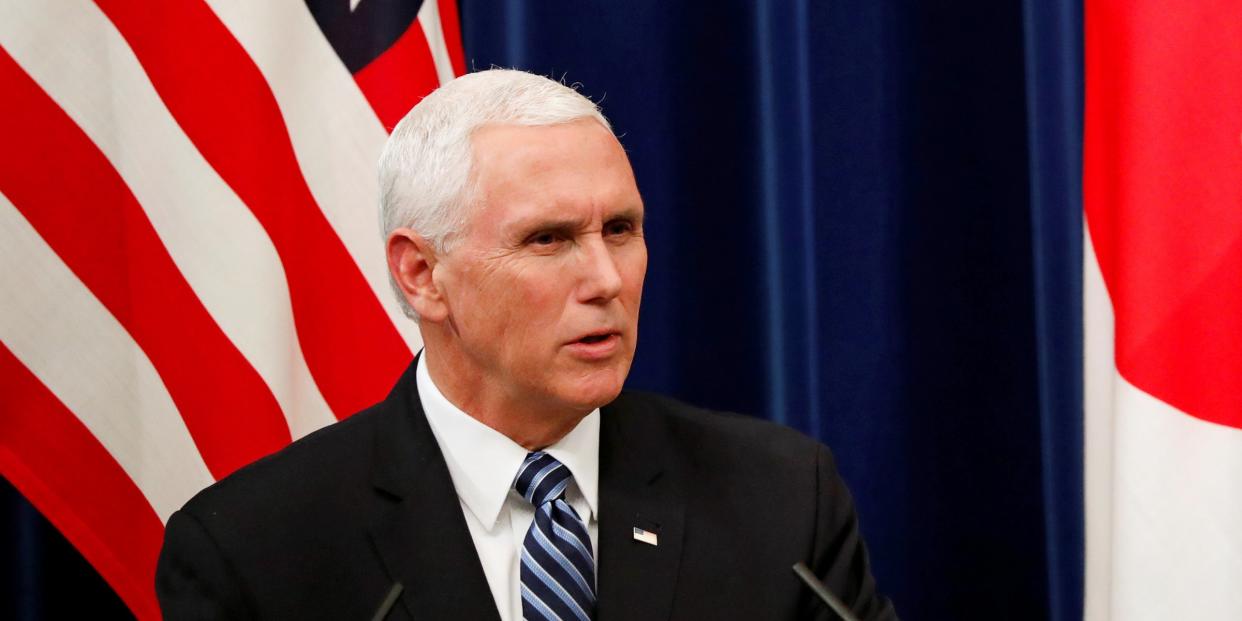'We are here to stay' — Pence says he personally challenged China with a South China Sea flyby

REUTERS/Issei Kato
The vice president flew through the South China Sea Tuesday, reportedly to send a message to the Chinese.
He described his flyby as something of a "freedom-of-navigation" operation, The Washington Post reported.
Speaking earlier in Tokyo, he stressed that "authoritarianism and aggression have no place in the Indo-Pacific."
Vice President Mike Pence is traveling through Asia with a message for China, and that is that the US "will not be intimidated."
Flying from Japan to Singapore Tuesday, the vice president's Air Force 2 airplane reportedly passed within 50 miles of Chinese outposts in the contested Spratly Islands. Speaking with The Washington Post's Josh Rogin, Pence characterized the flight as something of a "freedom-of-navigation" operation.
As Pence's aircraft was actually a good distance from the islands, his flyby in the South China Sea obviously did not serve as an official FONOP or even as a particularly-demonstrative overflight, like the flights occasionally conducted by US Air Force bombers.
The US military conducts FONOPS around the world on a regular basis, typically to signal that the US does not recognize a country's territorial claims. In the South China Sea, these operations have become less about territorial sovereignty and instead are about standing up to Chinal. In that sense, Pence's intentions were right on target.
Beijing claims the vast majority of the South China Sea, and while China's extensive claims to the region were discredited by an international arbitration tribunal two years ago, the Chinese military has continued to strengthen its position in the important strategic waterway.
China has typically responded to US military activities in the region with critical rhetoric, but the situation escalated in late September during a tense showdown between the US and Chinese navies. A Chinese People's Liberation Army Navy (PLAN) Type 052C Luyang II-class guided-missile destroyer challenged the US Navy destroyer USS Decatur following its close patrol through the Spratlys.
This troubling incident, during which the two ships nearly collided, was preceded by multiple B-52 bomber overflights, which Beijing called "provocative."
During his flight to Singapore Tuesday, Pence reiterated some of the points he made during a tough speech on China at the Hudson Institute last month. "We will not be intimidated. We will not stand down. We will continue to exercise freedom of navigation," he said, adding that if China refuses to play ball, "then so be it. We are here to stay."
"We seek an Indo-Pacific where every nation … is free to follow its own path and pursue its own interests, where the seas and skies are open to all engaged in peaceful activity, and where sovereign nations grow stronger together," the vice president explained earlier in Tokyo.
He restated the Trump administration's position that "authoritarianism and aggression have no place in the Indo-Pacific." Rising tensions between Washington and Beijing come amid what some observers are describing as a new Cold War.
NOW WATCH: Take a look inside the UK's first Japanese capsule hostel where you can sleep inside a pod for £25
See Also:

 Yahoo News
Yahoo News 

